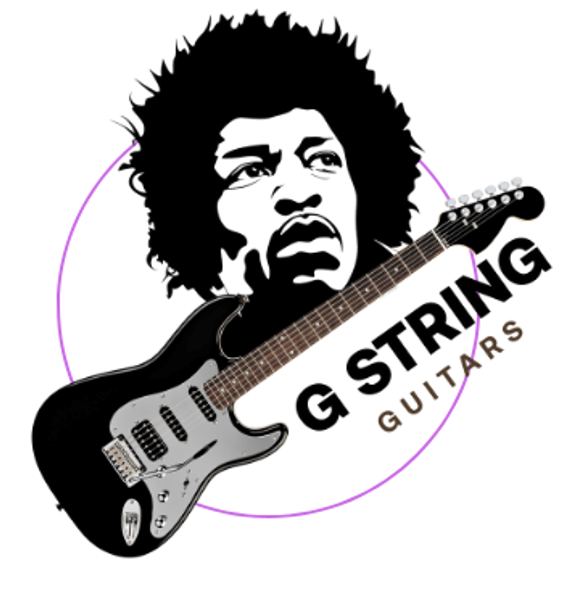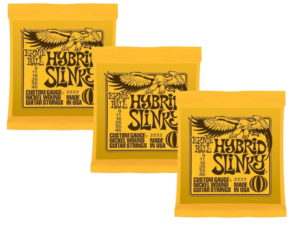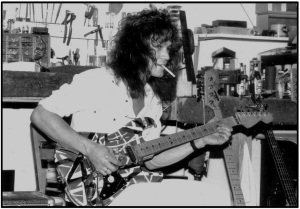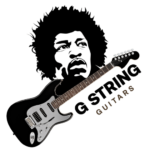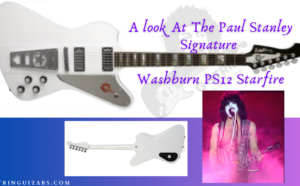This Post May Contain Affiliate Links
In compliance with the FTC guidelines, please assume that some of the links on these posts and sites are affiliate links (Amazon or others) from which I may earn a small compensation/commission from sales of certain items at no extra cost to you from qualifying purchases.
Anytime you see a link that looks like “astore.com, paid link, #ad, #CommissionsEarned or Amazon/Amazon.com/ca,”… it can be assumed that it is an affiliate link.
To learn more, follow the link below.
7 Ways To Upgrade An Electric Guitar
Do you own an electric guitar?
Are you looking to upgrade your existing instrument with new appointments?
Are you still trying to figure out the best counterparts in the market?
Fret not! You’re looking in the right place.
This post looks at 7 excellent upgrade options for different guitar parts to take your playing to the next level.
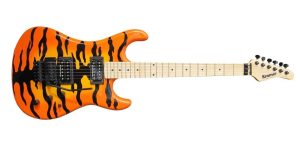 The Strings
The Strings
Nothing sounds better than a brand-new set of strings. Certainly, they top the list of parts of a guitar that are worth upgrading.
Like most things Guitar, Strings are a personal choice item that, along with the Scale length, String gauges will account for how the guitar feels.
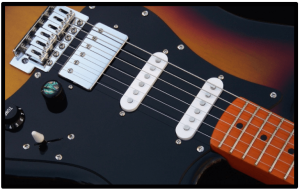
Our pick here is coated strings, like Elixir Nanowebs, which promise great longevity and keep their tone over repeated plucking.
Besides upgrading your guitar strings, picking the correct gauge for a flawless tuning experience is also necessary.
Go for well-known name brands like Dunlop, Elixir, D’Addario, and Ernie Ball, as they are the best in the business, producing standard and hybrid strings for models, no matter the guitar designs.
Tuners
Perhaps the worst thing for an electric guitar is the ability not to maintain tuning stability; this is one of those pieces of hardware that will wear out in time.
With the newer options today, you can secure and enhance the appearance of your instrument by investing in locking tuners.
What Is A Locking Tuner?
It is a piece of hardware that requires no wrapping like the standard designs.
Locking Tuners effectively improve the time it takes to change strings and are used by pro guitar techs.
This concept involves a clamping mechanism with a turning wheel on the back or on top of the tuner that secures the strings and prevents slippage. (See image)
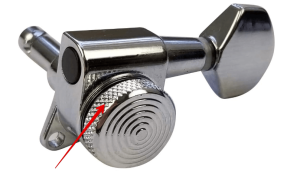
Locking Guitar Tuners Chrome 6 In-line 19:1 Machine Heads w/turning wheel-Image courtesy of Amazon- Tap image to see more.
Different From A Locking Nut
Note…
Locking tuners are not the same as locking the guitar nut “in Tune” like on a Floyd Rose system.
The Floyd locks the strings at the nut and bridge, leaving the tuners on the headstock ineffective. (More on this later)
Video 1 How to Use Locking Tuners
The Nut
The nut is another significant guitar part; it is a small piece of material with grooves to help keep the strings in line and form an anchor point (along with the bridge saddles). It is essential to playability, tuning stability and tone.
Considering a nut upgrade is worth every penny, and there are many to choose from with different materials available. (ie, brass, bone, plastic or graphite.)
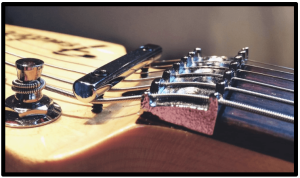
When you get the tension right for the strings, starting from the bridge and ending at the nut, you will have a better-sounding tone every time.
Pro tip: Add some graphite to the string slots along the nut to reduce friction and make your guitar sound better and sharper.
Control Pots
Getting a quality lower-end guitar has become more accessible, but with these instruments, corners often get cut on the Electroncs, wires, knobs, and pots, commonly diminishing over time; upgrading them over several years is always a wise call.
Faulty, malfunctioning or less-quality electronics can often be the underlying reason for poor sonic response and tone; thus, upgrading your pot values can give you a more precise and powerful output.
When upgrading your guitar’s Control Pots, go for brands like CTS, which are used on many higher-end model instruments.
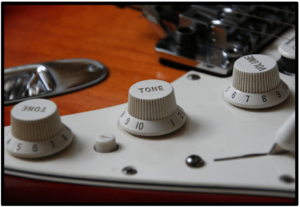
Modifications May Be Needed
Based on your instrument, some modifications may need to be made to accommodate the change in Control Pots or Electronics; (i.e. your older control knobs will rarely be reusable from your older setup to the newer one), so always look to your local Luthier for support.
Video 2 Tips For Upgrading Control Pots
Pickups
What’s a guitar without a decent pickup? After all, pickups make your guitar sound individual.
For instance, due to their lower output, single coils are known for their dynamic range with a brighter, more vibrant sound.
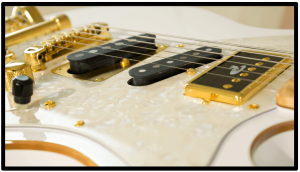
Comparatively, humbucker pickups are just the opposite, with higher outputs, leading to a warmer sound and compressed dynamics.
Some electric guitar models use Active pickups that work on 9v batteries and readily support built-in preamps for enhanced sound output.
Some pickups can be upgraded easily, and some may take more comprehensive knowledge.
IE…
- If you want to switch from passive to active pickups, the instrument’s circuitry will need to be changed for the new power station to be compatible.
Bridge
When choosing a guitar bridge, there are commonly 2 main types.
- Fixed &
- Tremolo
While upgrading the guitar bridge can be tricky, it’s worth your investment.
For instance, moving from a Stock Vibrato Fender Stratocaster Bridge to a Floyd Rose will help boost sustain and tuning stability while using the Tremolo Arm as part of your playing.
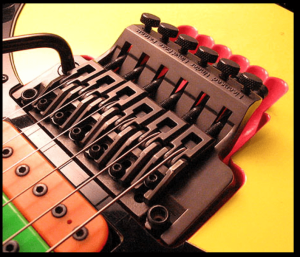
The Ibanez Edge-Licensed Ibanez Floyd Rose variant -Image courtesy of Wikipedia -Author Nuno- Released into the Public Domain
History & Brief Description Of Floyd Rose
Floyd D. Rose, a jewellery maker and guitarist inspired by players like Jimi Hendrix and Richie Blackmore, could not keep his 1957 Fender Strat in tune while using the stock vibrato bar despite trying the recommended processes of the time.
- Lubricating the nut (mentioned earlier) or
- Winding the strings as little as possible around the tuning pegs.
He took it upon himself to invent the Locking Tremolo in 1976, gaining popularity in the 80s from players like…
- Eddie Van Halen
- Joe Satriani
- Kirk Hammett
- Allan Holdsworth and more
It was designed to stay in tune despite extreme pitch changes from using the vibrato arm, as much as a fifth or a seventh.
The Tuning Stability Comes Through The “Double-Locking” Design
The Term refers to the strings being locked tightly with a unique mechanism at the nut (green in the image) and at the bridge (turquoise.)

The Floyd Rose w/Double Locking Design- Image courtesy of Wikipedia-Autor Freywa- and is licensed under the Creative Commons Attribution-Share Alike 3.0 Unported.
Tuners Added To Bridge
With the traditional headstock tuners not functioning after the strings are locked on the nut, adding a set of bridge tuners allows for fine-tuning. (See image)
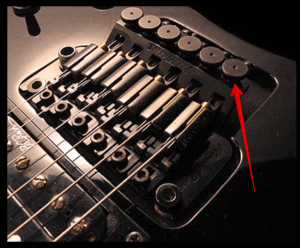
Image of the Floyd Rose SpeedLoader with tuners at the bridge -Image courtesy of Wikipedia- Author Nuno and is in the Public Domain.
Floating Bridges
“Floating” is a term used to describe a typical Floyd Rose Bridge that can be raised and lowered with the vibrato bar for pitch variation and used as part of a playing style like Steve Vai.
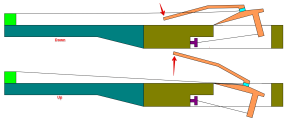
The Floyd Rose w/downward and upward floating bridge- Image courtesy of Wikipedia-Autor Freywa- and is licensed under the Creative Commons Attribution-Share Alike 3.0 Unported
The Downside Of A Floating Bridge Setup
If a string breaks, the balance of tensions on the bridge is disrupted, leaving the bridge out of position and the guitar out of tune.
Challenging Tuning
With the tension of one string affecting the tension of all the others, it can take several iterations through the process before the instrument is tuned, making it challenging.
Fret Buzz
Note that when using the vibrato bar, string action (the distance between the strings and the fretboard) is affected, and this can sometimes cause the strings to unintentionally touch the frets and create unwanted buzz on instruments set up with extremely low action or heavily recessed vibrato installations.
What Is Fret Buzz?
This is when strings vibrate against instead of vibrating over the fret, creating a buzzing sound.
Saddle Height adjustments may need to occur to help compensate for this issue.
Talk to your Guitar Tech for more assistance.
Half Floating
Some Guitar players did not want the ability to move the vibrato arm in both directions, opting instead to have a “Half-floating” Floyd bridge.
A term used to describe the system only allowing downward motions.
This Enabled Several Benefits
In this setup, having the cavity of the tremolo pocket not thoroughly milled away underneath and pressed against the guitar’s body, preventing movement, the results had the benefit of a broken string not affecting the pitch of the other strings as in the Floating setup.
D Tuna Addition
The Half floating bridge allows fitting a device to the bridge called the D-Tuna that can drop the low E-string down to D to extend the tonal variety of the guitar, even during live performance. (See image)
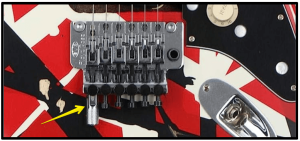
The EVH Striped Series Frankenstein Relic – Red/Black/White– with the EVH-bred Floyd Rose Tremolo with D-Tuna in Black-Image courtesy of Amazon -Tap image to see more.
History Of The D-Tuna
This bridge detuning design was invented by no other than self-taught Luthier Eddie Van Halen for retuning the low E string instantly from an E to D and back again.
It is used commonly in conjunction with the Floyd Rose Tremolo.
As a come-of-age guitarist, you must have heard about Fretwraps.
They are increasingly used by seasoned musicians worldwide (i.e. Guthrie Govan) to tighten the sound output, thereby adding to the clarity of notes played.
When looking for online guitar parts, Fretwraps are an essential upgrade; this dampening accessory is designed to kill string overtones from your playing and control mechanical noise created by “Sympathetic Vibration,” helping to keep the instrument quiet.
All you need to do is wrap them around the neck, moveable above or below the nut or guitar tailpiece, and you are sorted!
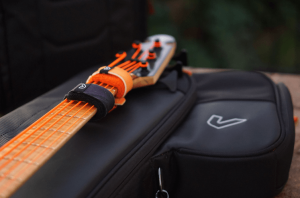
Gruv Gear FretWraps in Orange & Black
Do Not Have Any Fret Wraps But Would Like To Apply Dampening?
Tip
Electric tape or hair bands are another great option when looking to dampen your instrument.
Place the tape before the nut or hair band right after the nut or before the start of the bridge, and you’re done.
This is handy when playing your guitar for an in-studio recording.
Wrap Up
There you go, many vital upgrades for guitar parts that can seamlessly enhance your playing experience.
These days, you can get any online guitar parts without breaking the bank.
Because Guitars are designed to be upgraded, this can be done at any level of your Guitar Journey and on virtually any instrument.
It’s about time you upgraded your guitar to elevate your playing experience.
Did You Like This Article?
Guest Post was written and submitted by Nethan Paul
Nethan Paul is an Art lover, Guitarist and Sportsman – He lives his daydreams in music, loves to share his thoughts with people because life is also about information exchange,
Keep learning, and keep sharing.
We appreciate his contribution to our community.
If you want to write for G String Guitars, follow the link to Guest Post Guidelines.
Feature image courtesy of PIRO from Pixabay
The first guitar image by Bremslaeufer from Pixabay
Control Knobs image courtesy of hendrikertel from Pixabay
All other photos provided by FaberUSA.com
______________________________________________________________________________

Starting A Journey At 7 Years Of Age, The Love For The Guitar Only Became Stronger Going Into My Teens. This Leading To An Exciting Time Of Teaching, Performing, And Recording. Join Me Now As We Can Bring The Love Of This Instrument To Other Musicians Globally.
